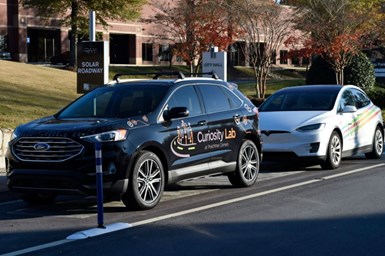A Ray of Sunshine for EV Charging?
Solar-powered roadway energizes Georgia charging station
#hybrid
Curiosity Lab, a year-old smart city tech startup in Peachtree Corners, Ga., has installed what it claims is the first surface-powered solar panels in the U.S. to power a charger for electric vehicles.

(Image: Curiosity Lab)
Dubbed Wattway, the roadside solar panels are produced by France’s Colas Group.
The system was provided to Peachtree Corners through a partnership with The Ray, a nonprofit, living laboratory and proving ground located along an 18-mile stretch of Interstate 85 near the Georgia/Alabama border.
How It Works
Embedded in an autonomous vehicle test lane, the solar array can produce some 1,300 kWh of electricity per year for a Level 2 EV charger installed at Peachtree Corners’ city hall.
The charger is equipped with an energy storage system for nighttime charging, according to the developers.
During the pilot program, drivers can use the system to recharge their EVs for free.
What’s Next?
“While this new form of 100% renewable energy will begin with supplying power to an EV charging station, our vision is to begin to power more existing infrastructure across the city,” says Brandon Branham, Peachtree Corner’s assistant city manager and CTO. He lists potential applications in sidewalks, bike lanes and other off-grid surfaces.
Colas has been testing the technology in Europe, in conjunction with the French National Solar Energy Institute, for several years with mixed results. An ambitious system installed in Normandy in 2016 was panned last year for not living up to expectations. That system was designed to power street lights.
The Peachtree installation is said to be more durable and efficient, resulting in a 21% performance increase over previously deployed panels.
RELATED CONTENT
-
When Automated Production Turning is the Low-Cost Option
For the right parts, or families of parts, an automated CNC turning cell is simply the least expensive way to produce high-quality parts. Here’s why.
-
Multiple Choices for Light, High-Performance Chassis
How carbon fiber is utilized is as different as the vehicles on which it is used. From full carbon tubs to partial panels to welded steel tube sandwich structures, the only limitation is imagination.
-
on lots of electric trucks. . .Grand Highlander. . .atomically analyzing additive. . .geometric designs. . .Dodge Hornet. . .
EVs slowdown. . .Ram’s latest in electricity. . .the Grand Highlander is. . .additive at the atomic level. . .advanced—and retro—designs. . .the Dodge Hornet. . .Rimac in reverse. . .








